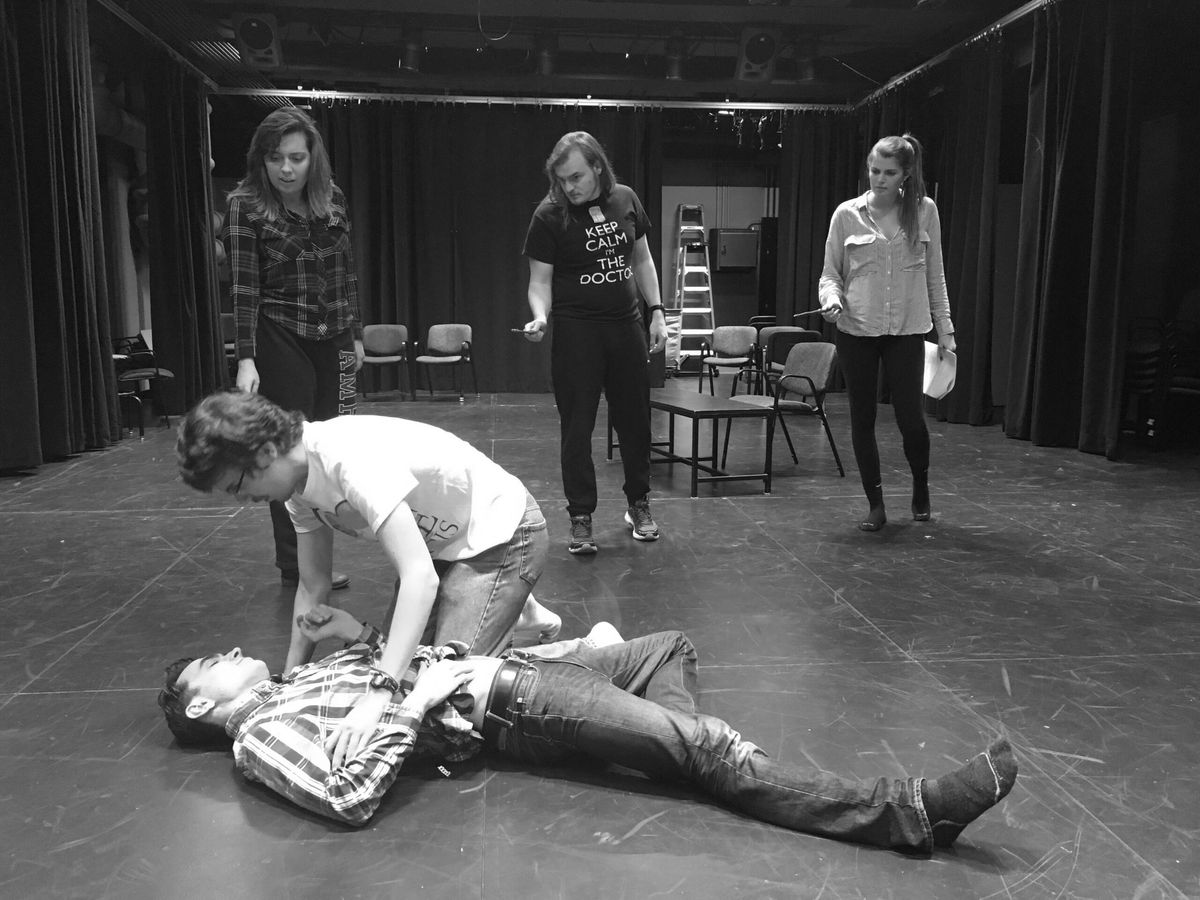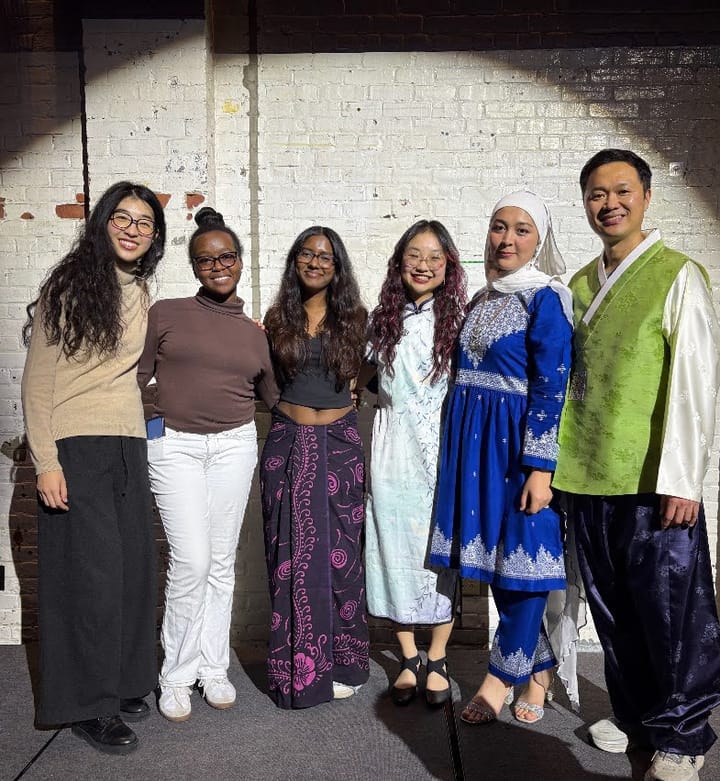Green Room’s Latest Endeavor Parodies New Harry Potter Spin Off

Whether it’s because of the conclusion of a stressful election or the conclusion of a stressful semester, we could all use a laugh right now. Unlike the “Harry Potter fandom” who had to wait five years for something new to be added to canon, Amherst students will only have to wait a month for some serious laughter. One of Amherst’s student-driven theater groups, Green Room, has currently been working on a parody of J.K. Rowling’s “Cursed Child,” the latest addition to the lineage of Harry Potter novels, which is formatted as a play. The script is completely student-written and full of their original wit, complete with hilarious puns and meta jokes to tickle any Potterhead’s fancy.
I recently had the opportunity to sit in on rehearsal and witness the magic for myself. In their typically and infectious enthusiastic fashion, the Director (Dakota Meredith ’17), stage manager (Sophina Flores ’20) and two main leads (Michael Barnett ’18 as Albus Potter and David Green ’18 as Scorpius) obliged me in a request for an interview.
Q: How did the idea for this project come about?
Michael Barnett: I read “Harry Potter and the Cursed Child” over summer break, and my initial idea was to do a staged reading of it because it was popular and was likely to draw an audience. The trouble was, quite honestly, copyright issues. There was no way we’d legally be able to do any sort of public reading from the script. Instead, I realized that it might be fun to do a parody — especially given how ridiculous many parts of the play are. There’s a lot to play on, from the apparent contradiction of canon, to the homoerotic tension between the two main characters, to the strangeness of the play itself. Dakota was on board from the moment I suggested it to her, and one of us proposed it at as a project the Green Room project meeting at the beginning of the semester.
Q: What was involved in the process of writing a parody?
MB: After we broke the play down into about 12 scenes (the original script has 75) we assigned individual writers to each scene. Afterwards, of course, we had to read back through the script and make numerous changes for continuity of plot and of jokes so it doesn’t feel like it has six different writers. One of the most important things I think we did is look at each character specifically to ensure that each character’s arc carries through the way we want it to and any character-specific jokes are evenly distributed throughout the play.
Dakota Meredith:As the head of the writing project, I tried to structure our process in such a way that would allow us to preserve as many of the narrative elements of “Harry Potter and the Cursed Child” as possible while also eliminating those that didn’t tie into the story we wanted to tell. My first major step was to carefully re-read the play, taking notes on the main actions or conflicts in each scene, then adding in my own ideas of potential jokes we could make. That summary was then sent to the rest of the writing team: Michael Barnett, Sophina Flores, Denison Marsland-Rello ’18E, Max Paul ’18 and Tessa Peierls ’20E. We spent about two weeks adding our own ideas to the summary and meeting as a group to discuss them before deciding on a specific outline of what would happen in each scene, as well as what ideas would be cut. From there, the scenes were divvied up. Each writing team member was given time to write the scenes they’d chosen before we reconvened. The first draft of that completed script was then edited extensively; some pieces were added, taken out and modified a good deal before we had a script we felt ready to audition from.
Q: Can an audience member enjoy “Harry Potter and the Slightly Unfortunate Child” even if they haven’t read “Cursed Child”?
MB: I think it will be. We certainly intended it to be, because we’re aware that the play just came out a couple of months ago and it is unlikely that everyone has read it yet. Obviously, we make jokes that will be more funny if you’ve read or seen “Harry Potter and the Cursed Child,” but we really put a concerted effort into making even those jokes accessible to the rest of the audience. I would definitely argue that most of the jokes in the script are jokes about the original Harry Potter series (this is helped along by a healthy dose of time travel).
David Green: When I learned I would be doing the show, I took it upon myself to neglect my work and read the book in two days (sorry professors) so I wouldn’t get any spoilers from the parody. By its very nature, the parody does contain many spoilers of “Cursed Child,” but I don’t think this should be a deal-breaker. In a lot of ways, we outline the plot of the original story pretty clearly, so watching should be like a very, very ridiculous take on what an audience member would have read or seen anyway. The show stands alone quite well, and the readers of our script have had no idea what was pure source material and what was altered. It will absolutely be a joy to witness, whether you know the story or not.
Q: What has it been like directing and stage-managing the show thus far?
DM: This is the first show I’ve ever directed, and so far it’s been an amazing experience! The energy the actors bring to rehearsals each and every day is incredible, and it’s been a joy to work with them as we continue to block the show. While they take my directions, they’re also always coming up with new and creative ideas to bring comedy and enthusiasm to each scene in ways that I couldn’t have envisioned by myself. As a new director, I’ve tried to adjust my preconceptions about what I thought the job would be like in order to make the show’s production into more of a flexible, collaborative process while still maintaining my own artistic vision.
SF:The most rewarding part of stage managing is always getting to work closely with the actors, who I love dearly, on a day to day basis. I am also very much looking forward to when we introduce the technical aspects, because seeing a show come together, and being a part of the glue that holds it together is what I live for. Participating in lighting design for the first time is also an experience that I am very excited for, and organizing the many props and costumes needed for this show will be a joy. My happiest place in the world is calling a show from the tech booth, and this is the first time I will have had the chance to do that at Amherst. I am also extremely grateful that Green Room exists to offer me these opportunities, which I did not expect to find with such ease as a first-year in college
Q: What should audience members expect (or prepare themselves for) when they come to see the show?
DG:The audience should expect to see a marvelously ridiculous piece of theater. We are taking a Harry Potter play that is already far more whacky than the original series and exaggerating it until it becomes the pinnacle of comedy (or thereabouts). That being said, the plot holds together as well as it can, considering its nature as a parody and its source material’s absurd plot holes (which are nodded to in a unique way in practically every scene). I am sure that the audience will see that we, the actors, are having the time of our lives, and that fun will be infectious. There is a great deal of physical humor, which requires little context, and all other jokes are fully explained.
The show’s length runs at an hour and a half.




Comments ()